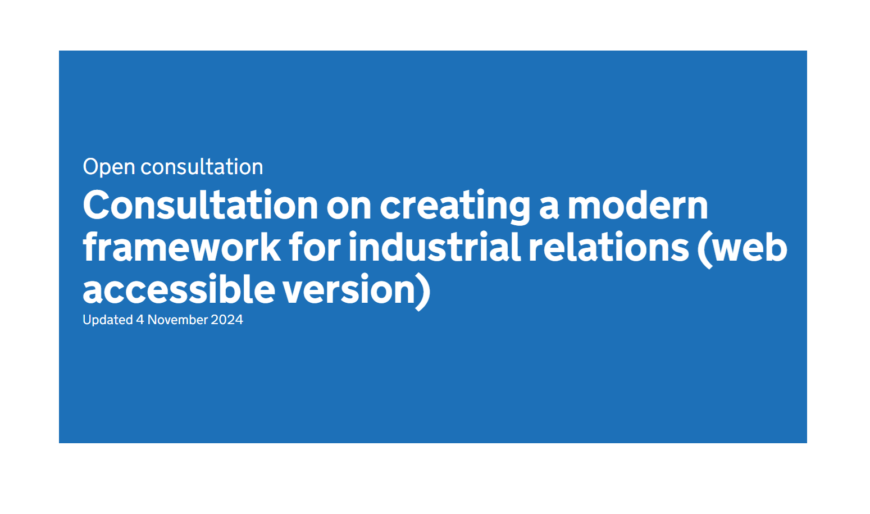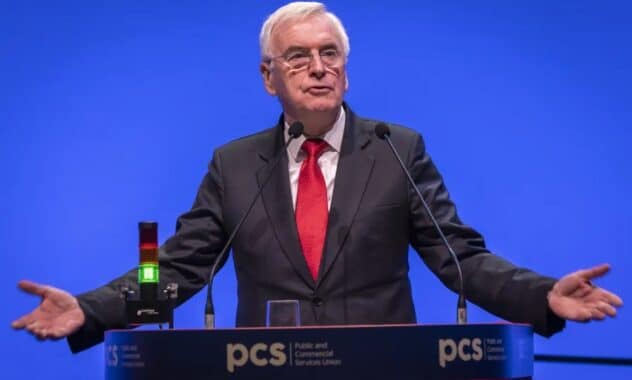Government opens consultation on “creating a modern framework for industrial relations”
Consultation responses required by the 2nd December 2024

The new Labour government has opened a consultation on their Employment Rights legislation, contained the 2024 election manifesto as “Labour’s Plan to Make Work Pay” and now making its way through the House of Commons as the Employment Rights Bil. In the foreword to the consulation, Angela Rayner (Deputy Prime Minister and Secretary of State for Housing, Communities and Local Government) and Jonathan Reynolds (Secretary of State for Business and Trade and President of the Board of Trade) outline the ideas that underpin the legislation:
“This government was elected on a mandate to make work pay and secure a new deal for working people, one delivered in partnership with employers, workers, and trade unions.
Our Plan to Make Work Pay will close those loopholes to protect workers, making sure that good companies are not undercut by bad ones and that workers can get together and speak up to protect themselves from insecurity, inequality, discrimination or low pay.
Most employers treat their staff well because they know it makes good business sense. Sadly, there will always be unscrupulous firms that take advantage of any loophole available. We are ensuring that workers are protected from exploitation by those companies who would abuse their power.
Rather than working in partnership with businesses, trade unions and workers, the previous government introduced significant restrictions on trade union action, and despite undemocratic legislation being enacted to reduce strikes, industrial action persisted.
This government has already committed to repealing ideological, ineffective anti-union legislation, including the Trade Union Act 2016 and the Strikes (Minimum Service Levels) Act 2023. The UK lost more days to strike action in 2022 and 2023 than in any year since 1989, and the Strikes Act 2023 failed to prevent a single day of industrial action while in force.
These strikes did not happen because workers or trade unions had too much power. It was because ministers chose to avoid grown up negotiation and failed to get around the table and bring people together to find a resolution. They chose instead to take aim at the rights of workers by imposing unnecessary red tape on trade unions, with longer notice periods and minimum service levels.
This government wants people to have a voice at work and let them exercise control over their working lives. Whilst most employers do good by their workers, when this doesn’t happen, workers must have the ability to act collectively.
Therefore, we will update trade union legislation, so it is fit for a modern economy, removing unnecessary restrictions on trade union activity and ensuring industrial relations are based around collaboration, proportionality, accountability, and balancing the interests of workers, businesses and the wider public.
Our existing framework for industrial relations and collective bargaining is full of inefficiencies and anachronisms that work against cooperation, compromise and collaboration. We want to create a positive and modern framework for trade union legislation that delivers productive and constructive engagement, respects the democratic mandate of unions, and works to reset our industrial relations. The changes set out in this consultation will do just that.
Introduction of the Employment Rights Bill within 100 days of taking office shows this government’s commitment to delivering the change the country voted so decisively for in July. We welcome the insights of all respondents and look forward to working with businesses, trade unions and civil society to grow our economy and raise living standards for everyone, everywhere.
That is what is in the interests of both employers and working people.
The Rt Hon Angela Rayner MP
Deputy Prime Minister and Secretary of State for Housing, Communities and Local Government
The Rt Hon Jonathan Reynolds MP
Secretary of State for Business and Trade and President of the Board of Trade”
You can read about the consultation here and you can respond by to the consultation a number of ways:
Respond online
or
email to
tradeunionpolicy@businessandtrade.gov.uk
or
Write to
Trade Union Policy, Employment Rights Directorate
Department for Business and Trade
Old Admiralty Building
Admiralty Place
London
SW1A 2DY







